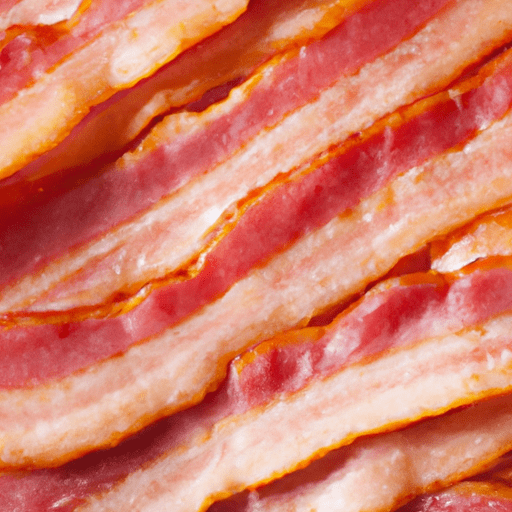The Delightful World of Turkey Bacon: A Healthier Twist on a Breakfast Classic
Are you a bacon enthusiast who’s looking for a healthier alternative? Look no further than turkey bacon! This delightful twist on a breakfast classic offers a delicious and lighter option that’s worth exploring. In this blog post, we’ll dive into the world of turkey bacon, unveiling its taste, common uses in cooking, nutritional value, and some interesting history and facts.
The Taste of Turkey Bacon
Turkey bacon is a leaner and milder alternative to traditional pork bacon. It offers a subtly sweet and smoky taste, often with a hint of herbs and spices. While it may not have the same intense flavor as its pork counterpart, turkey bacon brings its own unique appeal to the breakfast table.
Versatility in the Kitchen
Aside from being a popular choice for breakfast, turkey bacon is a versatile ingredient that can enhance a wide range of culinary creations. Here are some common uses for turkey bacon in cooking:
- Sandwiches and Wraps: Turkey bacon adds a crispy, savory element to sandwiches and wraps, providing an extra layer of flavor and texture.
- Salads: Crumble it on salads to give them a touch of smokiness and a satisfying crunch.
- Pasta Dishes: Incorporate turkey bacon into pasta dishes like carbonara or in creamy sauces for a lighter option that doesn’t compromise on taste.
- Appetizers: Wrapped around vegetables, prawns, or scallops, turkey bacon can elevate simple appetizers into impressive and delicious bites.
Get creative in the kitchen and experiment with turkey bacon in your favorite recipes - you might be surprised by its versatility!
Nutritional Value
One of the significant advantages of turkey bacon is its lower fat content compared to traditional pork bacon. It’s a great source of lean protein and contains less saturated fat, making it a healthier choice for those conscious of their dietary intake.
Let’s take a closer look at the nutritional profile of turkey bacon:
- Protein: Turkey bacon is an excellent source of protein, providing around 14 grams per serving. Protein is essential for building and repairing tissues, as well as supporting a healthy immune system.
- Lower Fat Content: Compared to pork bacon, turkey bacon contains significantly less fat, making it a suitable option for individuals looking to reduce their fat intake. However, be mindful of sodium levels, as processed turkey bacon can sometimes be higher in sodium.
- Vitamins and Minerals: Turkey bacon contains essential vitamins and minerals, including zinc, niacin, and selenium, which play vital roles in supporting overall health and wellbeing.
While turkey bacon offers a healthier alternative, it’s essential to enjoy it as part of a balanced diet that includes a variety of other nutrient-rich foods.
Fun Facts and History
- Turkey bacon became popular during the early 1990s, as health-conscious consumers sought lighter options without compromising taste.
- The texture and appearance of turkey bacon closely resemble traditional pork bacon, making it an appealing choice for those looking for a similar experience with fewer calories.
- While it may not be bacon in the traditional sense, turkey bacon provides a satisfying alternative that stands on its own merit.
Next time you’re looking to switch things up in the kitchen, consider giving turkey bacon a try. Its delicate flavor, versatility, and health benefits make it a fantastic option for breakfast and beyond.
So, why not prepare yourself a crispy and delicious plate of turkey bacon for breakfast tomorrow? Let your taste buds experience this flavorful twist on a breakfast classic while knowing you’re making a healthier choice. Bon appétit!
Facts about Turkey Bacon:
Origin: Turkey bacon is a bacon alternative made from turkey instead of pork. It is primarily popular in the United States.
Ingredients: Turkey bacon is made from turkey meat, often a blend of dark and white meat. It is typically cured with salt and other seasonings, and may include additives like sugar, smoke flavorings, and preservatives.
Common Uses: Turkey bacon can be used as a substitute for pork bacon in many dishes. It is often enjoyed as a breakfast meat, used in sandwiches, wraps, salads, or as a topping for burgers, soups, and stews.
Nutritional Benefits: Compared to pork bacon, turkey bacon generally contains fewer calories, less fat, and lower levels of cholesterol. However, the exact nutritional profile can vary depending on the brand and cooking method used.
Unique Properties: Turkey bacon typically has a leaner and milder flavor compared to traditional pork bacon. It also tends to be less crispy when cooked. Some people choose turkey bacon as an alternative due to dietary restrictions, religious beliefs, or personal preferences.
Historical Significance: Turkey bacon gained popularity in the late 20th century as a healthier alternative to pork bacon. It catered to individuals looking for reduced fat or pork-free options.




Use the share button below if you liked it.
It makes me smile, when I see it.